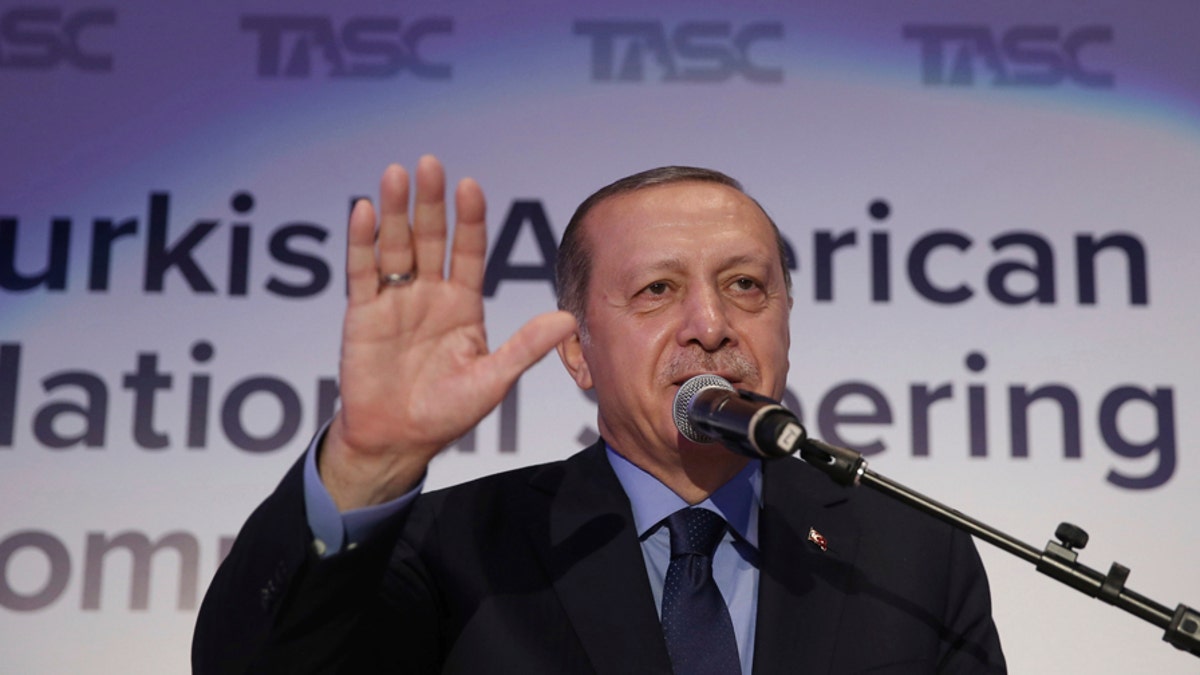
FILE -- Turkey's President Recep Tayyip Erdogan addresses a Turkish-American group meeting in New York, Thursday, Sept. 21, 2017. (Pool Photo via AP)
In Recep Tayyip Erdoğan’s post-coup purge of any entity deemed to have the slightest opposition to his authoritarian rule, he’s closed down 187 media outlets under the guise of being Gülenist – a synonym for any Turk not fawning at the feet of his Justice and Development Party (AKP).
But even before summer 2016’s short-lived coup, the Turkish president was embarking on a war against free speech. Bugün TV, which was stormed on a live broadcast two years ago by government forces unleashing tear gas, water cannons and gate cutters, was seized by the regime “to prevent crime.”
After the coup attempt, confiscated media outlets went on sale. The state-run Savings Deposit Insurance Fund found a buyer for the TV station: the killer of a Jewish businessman.
Sancaktar Media owner Burhanettin Türkeş was convicted in the 1995 murder of Nesim Malki, who was shot while driving in the northwestern city of Bursa. Türkeş was sent to prison in 2004 and released five years later.
Now, Türkeş is promising to tow the Erdoğan line in Bugün TV’s programming.
In July, protesters threw rocks at the Neve Shalom synagogue in Istanbul and kicked the doors in a fit of, as many anti-Semities call it, anti-Israel sentiment.
It’s not a surprising turn of events under a regime where anti-Semitism is a feature, not a bug, and the Gülen boogeyman meme takes on shades of “must be the Jews” as well. Pro-Erdoğan media have claimed that exiled cleric Fethullah Gülen must have Jewish lineage, thereby putting Jews at the center of the supposed coup plot.
“Fethullah Gülen is sharp witted. He quickly smells of money and power. Because he is a Jew. That’s the reason he loves Israel almost to the point of sickness,” Sabah columnist Ersin Ramoğlu wrote in December. “…Where his cunning comes from, why the CIA has gotten hold of him and his love of Israel can be understood from the family of this clown.”
Forestry Minister Veysel Eroğlu, in a December parliament speech, predicted Gülen would die in the U.S., where he has lived in self-imposed exile since 1999, “and he will be buried in a cemetery with Jews.” The party refrain on Erdoğan’s top foe is that traitor must equal Jew.
For more rank anti-Semitism, see the “not in my backyard” stunt: Before Kurdistan’s independence referendum at the end of September, pro-Erdoğan media frothed at the mouth spreading Jews-at-the-border fake news that KRG President Mahmoud Barzani planned to flood a new Kurdish state with 200,000 Israelis. That whipped up an ultra-nationalist protest that forced the evacuation of the Israeli Embassy in Ankara.
Pro-Erdoğan media breathlessly carry the president’s Rosh Hashanah best-wishes statements, but consider that Iran’s regime issues those empty felicitations as well. Propaganda and policy speak loudest. Turkey praised the reconciliation of Hamas and Fatah this month, with Erdoğan spokesman Ibrahim Kalın declaring, “Israel should end its siege on Palestinian lands and avoid any movement that would harm the reconciliation process.” On a delegation to Tehran, Hamas deputy chief Salah al-Arouri confirmed, “We’re not in the stage of recognition [of Israel]; rather we are now in the stage of preparing to eliminate the Zionist entity.”
Erdoğan has accused the Jewish state of "keeping Hitler's spirit alive.” In May, the president said of Israel, “They feel they are immune to any punishment for their crimes, but the international community needs to stand up against them.”
In July, protesters threw rocks at the Neve Shalom synagogue in Istanbul and kicked the doors in a fit of, as many anti-Semities call it, anti-Israel sentiment.
The Jewish community in Turkey is now fewer than 17,000 people. As Erdoğan pushes Islamism into Ataturk’s secular republic, as he holds onto power with a white-knuckle grip, as he arrests 60,000 Turks for perceived threats to his power and accuses them of all being magically woven into a Gülenist ouster plot – and his acolytes dutifully tie Gülen to Jews – the community has much to be nervous about.
